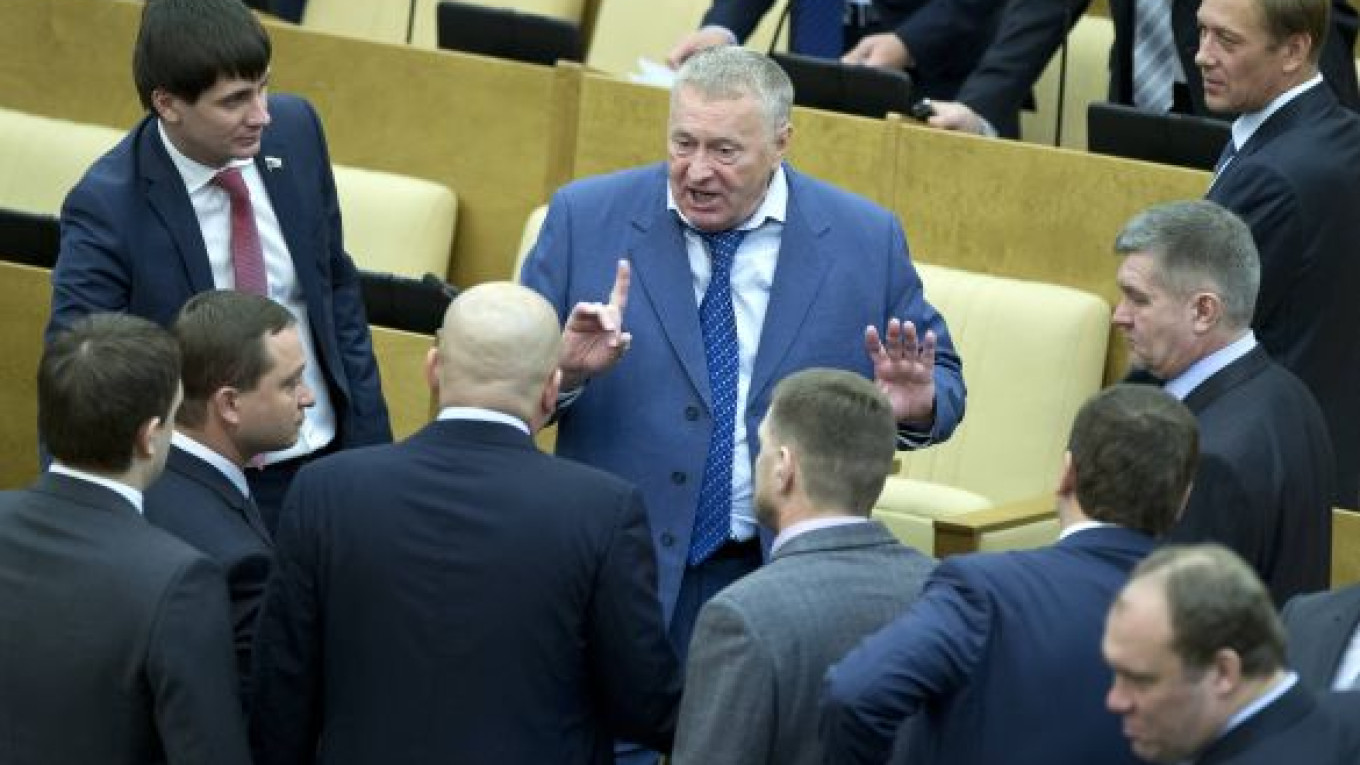On the State Duma's first day back to work this year, deputies sparred over whether to abolish a ban on adoptions of Russian children by American families, a measure passed late last year that has drawn fierce criticism.
Members of the Just Russia faction submitted a that would eliminate the ban included in the "Anti-Magnitsky Law," which was passed in response to a U.S. law punishing Russian human rights violators.
The bill's authors, who include outspoken opposition figures Dmitry Gudkov and Ilya Ponomaryov, said in a note to the bill posted on the Duma website that they wanted orphans to live with families regardless of their nationalities.
Gudkov told RIA-Novosti he didn't believe that the bill would be approved but that he and his fellow party members "respect the opinion of the citizens who have signed a petition [to abolish the ban on U.S. adoptions] and agree with it."
Constitution and State Affairs Committee head Vladimir Pligin of United Russia said the Duma couldn't consider that petition, organized by opposition newspaper Novaya Gazeta, because there was no legal procedure for doing so. But he said the committee recommended that the Duma "take [it] into account," according to .
The petition, which included more than 130,000 signatures, was discussed by Pligin's committee in a meeting attended by Novaya Gazeta editor-in-chief Dmitry Muratov on Monday.
Vladimir Zhirinovsky, the flamboyant leader of the Liberal Democratic Party, slammed defenders of U.S. adoptions in a on the floor of the Duma, calling them a "fifth column" who wanted to "take our intelligence away to America," a reference to Russian orphans.
He suggested posting on the Duma's website photos of those who "exude malevolence and lead an unbridled anti-state propaganda campaign." That was a reference to opponents of the ban, who marched in Moscow on Sunday carrying portraits of lawmakers who supported the ban with the word "shame" written over them.
Other Just Russia deputies submitted a bill Tuesday that would ease adoption procedures for Russian citizens, Interfax reported. On Monday, Prime Minister Dmitry Medvedev ordered his Cabinet to come up with ways to simplify the adoption process for Russians to help increase the rate at which orphans are placed in families.
Other topics expected to be tackled by the Duma in its spring session include parliamentary election reform, smoking rules, repatriation regulations and fixed sports matches, First Deputy Speaker Alexander Zhukov said at Tuesday's session.
A number of bills proposed by President Vladimir Putin in his state-of-the-nation address last month, including one that would change the procedure for electing Duma deputies, are likely to be submitted by the end of February, Zhukov said, Interfax reported.
Putin said in his speech that he supported changing the system for electing federal deputies back to a mix of proportional representation and winner-take-all constituencies, a scheme that could make it more difficult for smaller parties to win seats.
The current system uses proportional representation and party lists combined with a 7 percent hurdle to enter parliament. It replaced a mixed system in 2003.
At the same time, Putin said parties could regain the right to form electoral blocs. Such a system, which was in place in the 1990s, could increase smaller parties' chances of winning seats, although some say many smaller parties would likely ally with United Russia.
Another initiative outlined by Putin from having bank accounts and property abroad, a measure the president suggested could be unpopular among parliamentarians, many of whom vacation abroad and send their children to foreign schools
A 40-page plan for the Duma's work over the next six months that was posted on its lists about 90 bills to be considered.
On Tuesday, the Duma considered in the first of three readings.
Most of them were amendments to tax laws and the Administrative Offenses Code, while a few concerned election laws and the Forestry Code.
the introduction of a progressive taxation scale for personal income and tentatively approved an increase in social and property taxes and a tax exemption for certain types of transportation, research equipment and Far East residents
Deputies rejected amendments to the Administrative Offenses Code sponsored by LDPR that would have introduced fines aggressive driving or driving that creates a risk of accident, RIA-Novosti reported.
Contact the author at
Related articles:
A Message from The Moscow Times:
Dear readers,
We are facing unprecedented challenges. Russia's Prosecutor General's Office has designated The Moscow Times as an "undesirable" organization, criminalizing our work and putting our staff at risk of prosecution. This follows our earlier unjust labeling as a "foreign agent."
These actions are direct attempts to silence independent journalism in Russia. The authorities claim our work "discredits the decisions of the Russian leadership." We see things differently: we strive to provide accurate, unbiased reporting on Russia.
We, the journalists of The Moscow Times, refuse to be silenced. But to continue our work, we need your help.
Your support, no matter how small, makes a world of difference. If you can, please support us monthly starting from just $2. It's quick to set up, and every contribution makes a significant impact.
By supporting The Moscow Times, you're defending open, independent journalism in the face of repression. Thank you for standing with us.
Remind me later.


